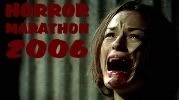
Perhaps it’s only from having the inanity of
The Da Vinci Code and lameness of
Cinderella Man for retrospective comparison purposes, but revisiting
A Beautiful Mind since it’s Oscar victory indicates the film, however undeserving a victor it remains, is a more fitting example of overly-touted mediocrity than outright garbage. The story of John Nash, the brilliant (and anti-social) mathematician who had to overcome schizophrenia (a psychological disorder which induces apparitions of nonexistent people and events) before ultimately winning a Nobel prize for his work, is given the lavish and all too typical Hollywood bio-drama treatment, complete with swelling score and a climactic standing ovation, signaling that the hero in question has overcome whatever obstacles the plot laid before him during the previous two hours. However, despite its un-ironic adherence to so many obtuse and dramatically stagnant conventions of the genre, half of
A Beautiful Mind actually comes close to being a very good film. Whenever the focus remains on the relationship between Nash and his wife Alicia (the always elegant Jennifer Connelly), the film approaches a quiet honesty towards its characters as well as something the rest of Howard’s catalogue cries out for dearly: subtlety. On the flipside, the creatively empty presentation of Nash’s psychological disorder ruins any greater potential with both its absurdity and character condescension. In presenting his personal traumas and ordeals, the film vies for the route of cheap visual tactics that serve almost entirely to keep the viewer in the dark until the big halfway-point twist, rather than providing any genuine insight into his experiences with the disorder – it’s the elusiveness of
The Sixth Sense without the thematic parallels, and ultimately no more than exploitation of his condition for traditional entertainment purposes. To add insult to injury, Howard’s direction slips from competent to nonexistent whilst giving the viewer a peek inside Nash’s mental processes – digits, documents and words light up as if the subject of a PowerPoint presentation as he completes theorems and solves codes. It’s headache inducing enough that a bout of schizophrenia might be just the chaser one needs after being mentally throttled by 2001’s “Best Picture.”




 Perhaps it’s only from having the inanity of The Da Vinci Code and lameness of Cinderella Man for retrospective comparison purposes, but revisiting A Beautiful Mind since it’s Oscar victory indicates the film, however undeserving a victor it remains, is a more fitting example of overly-touted mediocrity than outright garbage. The story of John Nash, the brilliant (and anti-social) mathematician who had to overcome schizophrenia (a psychological disorder which induces apparitions of nonexistent people and events) before ultimately winning a Nobel prize for his work, is given the lavish and all too typical Hollywood bio-drama treatment, complete with swelling score and a climactic standing ovation, signaling that the hero in question has overcome whatever obstacles the plot laid before him during the previous two hours. However, despite its un-ironic adherence to so many obtuse and dramatically stagnant conventions of the genre, half of A Beautiful Mind actually comes close to being a very good film. Whenever the focus remains on the relationship between Nash and his wife Alicia (the always elegant Jennifer Connelly), the film approaches a quiet honesty towards its characters as well as something the rest of Howard’s catalogue cries out for dearly: subtlety. On the flipside, the creatively empty presentation of Nash’s psychological disorder ruins any greater potential with both its absurdity and character condescension. In presenting his personal traumas and ordeals, the film vies for the route of cheap visual tactics that serve almost entirely to keep the viewer in the dark until the big halfway-point twist, rather than providing any genuine insight into his experiences with the disorder – it’s the elusiveness of The Sixth Sense without the thematic parallels, and ultimately no more than exploitation of his condition for traditional entertainment purposes. To add insult to injury, Howard’s direction slips from competent to nonexistent whilst giving the viewer a peek inside Nash’s mental processes – digits, documents and words light up as if the subject of a PowerPoint presentation as he completes theorems and solves codes. It’s headache inducing enough that a bout of schizophrenia might be just the chaser one needs after being mentally throttled by 2001’s “Best Picture.”
Perhaps it’s only from having the inanity of The Da Vinci Code and lameness of Cinderella Man for retrospective comparison purposes, but revisiting A Beautiful Mind since it’s Oscar victory indicates the film, however undeserving a victor it remains, is a more fitting example of overly-touted mediocrity than outright garbage. The story of John Nash, the brilliant (and anti-social) mathematician who had to overcome schizophrenia (a psychological disorder which induces apparitions of nonexistent people and events) before ultimately winning a Nobel prize for his work, is given the lavish and all too typical Hollywood bio-drama treatment, complete with swelling score and a climactic standing ovation, signaling that the hero in question has overcome whatever obstacles the plot laid before him during the previous two hours. However, despite its un-ironic adherence to so many obtuse and dramatically stagnant conventions of the genre, half of A Beautiful Mind actually comes close to being a very good film. Whenever the focus remains on the relationship between Nash and his wife Alicia (the always elegant Jennifer Connelly), the film approaches a quiet honesty towards its characters as well as something the rest of Howard’s catalogue cries out for dearly: subtlety. On the flipside, the creatively empty presentation of Nash’s psychological disorder ruins any greater potential with both its absurdity and character condescension. In presenting his personal traumas and ordeals, the film vies for the route of cheap visual tactics that serve almost entirely to keep the viewer in the dark until the big halfway-point twist, rather than providing any genuine insight into his experiences with the disorder – it’s the elusiveness of The Sixth Sense without the thematic parallels, and ultimately no more than exploitation of his condition for traditional entertainment purposes. To add insult to injury, Howard’s direction slips from competent to nonexistent whilst giving the viewer a peek inside Nash’s mental processes – digits, documents and words light up as if the subject of a PowerPoint presentation as he completes theorems and solves codes. It’s headache inducing enough that a bout of schizophrenia might be just the chaser one needs after being mentally throttled by 2001’s “Best Picture.”




